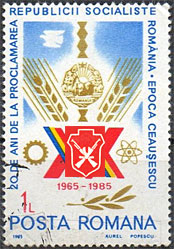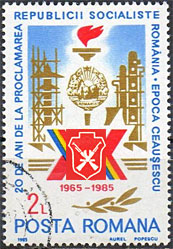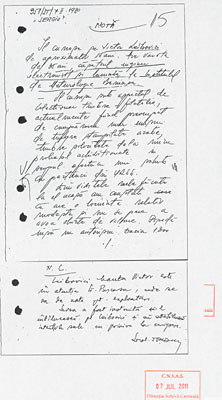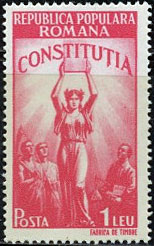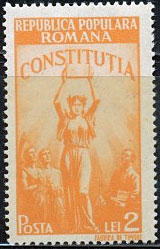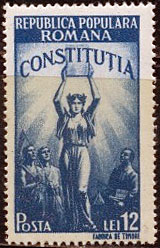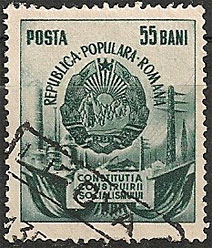The
Securitate (pronounced [sekuri'tate], Romanian for Security; official full
name Departamentul Securitatii Statului, Department of State Security) was
the secret police agency of Communist Romania. Founded on August 30, 1948,
with help from the Soviet NKVD, the Securitate was abolished in December 1989,
shortly after the president Nicolae Ceausescu was ousted.
The
Securitate was, in proportion to Romania's population, one of the largest
secret police forces in the Eastern bloc. The first budget of the Securitate
in 1948 stipulated a number of 4,641 positions, of which 3,549 were filled
by February 1949 ... By 1951, the Securitate's staff had increased fivefold,
while in January 1956, the Securitate had 25,468 employees. Under the regime
of Nicolae Ceausescu, the Securitate employed some 11,000 agents and had a
half-million informers, thia for a country with a population of 22 million by 1985.
Under Ceausescu, the Securitate was one of the most brutal secret police forces
in the world, responsible for the arrests and deaths of thousands of people.
|
|
Aug.
5, 1985. Michel 4169 - 4170. Twenty Years of Socialist Republic Romania. The Ceausescu
Epoch.
|
Note: the missing Securitate coat of arms were added by the author of this site. The crossed Kalashnikovs are perfectly reminiscent of what is seen on the flags of some African countries; see this page.
In
the 1980s, the Securitate launched a massive campaign to stamp out dissent
in Romania, manipulating the country's population with vicious rumors (such
as supposed contacts with Western intelligence agencies), machinations, frameups,
public denunciations, encouraging conflict between segments of the population,
public humiliation of dissidents, toughened censorship and the repression
of even the smallest gestures of independence by intellectuals. Often the
term "intellectual" was used by the Securitate to describe dissidents
with higher education, such as college and university students, writers, directors
and scientists who opposed the philosophy of the Communist party. Source
| |
|
With
daughter Irina in 1982, Bucharest, Herãstrãu Park, the
former I. V. Stalin Park
"What's a nice kid like you doing in a world like this"?
|
A
Denuntiation |
Because
the Romanian post hasn't issued stamps dedicated to Securitate forces (thus
preventing the users spitting on the wrong side of the stamp), I show a document
received by Securitate in 1980 from one of its numerous informants, a stamp
collector with the code name "Sergiu." This document is one of many
that belong to the file that Securitate gathered over the years about me.
I received in September 2011, on personal demand, a copy of the file, containing
this document too, from the C.N.S.A.S.
(Consiliul National pentru Studierea Arhivelor Securitatii - National Council
for Studying the Securitate Archives).
949/ST/4.II.1980
"Sergiu"
NOTE
I know Victor for about 15 years.
He is 35 years old, married, electronic engineer, and he works at the
Meteorology Institute Baneasa.
I know him as a collector of philatelic
stamps, he being at present interested in buying some cancelled stamp
issues from Arabic countries, stamps purchased from me, probably in
order to exchange them with some partners from USSR.
From my visits that I made to him I found
out that he has a relatively modest flat and that he doesn't seem possessing
valuable objects. But he is in possession of a car Dacia 1300.
... |
I
haven't reproduced the second page of the note, in which the informant speaks,
among others, about my relatives in France. I have only extracted a note,
added by a Lieutenant-Colonel (so important I was for them...), that informs that I am in the attention
of the Lieutenant Puscasu, to whom will be sent a note for the operation.
The source was instructed to meet me and to find out if I intend
to emigrate.
Here
is the place to remember those many letters that my philatelic friends from
abroad sent to me, letters that were obviously opened and closed again by
the Securitate workers, some stamps found inside having often suffered during
their barbaric processing. All this happened despite of the fact that the
secrecy of correspondence was guaranteed by the successive Romanian constitutions.
For example by the constitution
of 1965 (no stamp issued), art. 33, that guaranties the secret of correspondence
and of telephone calls. But then why is my Securitate file full of transcriptions
of my intercepted telephone conversations?
|
|
|
|
April
8, 1948. New Constitution. Mi. 1118 - 1120
|
Dec.
10, 1952. Next Constitution. Mi. 1415 |
Just to
finally mention that information provided by Securitate to my employer, pertaining
to my relatives abroad, contacts to foreigners, philatelic activity, no membership
of communist party, etc., were the reasons why my professional advancement
in R&D was totally blocked. The general lack of freedom, the mentioned
blocking and the permanent feeling of having the Securitate on my footsteps
were the reasons why, already aged 39, I left for good the communist Romania,
together with my wife and with my then three years old daughter.
If you wish
to contact me by e-mail, please click
here (take out SPAAM).
